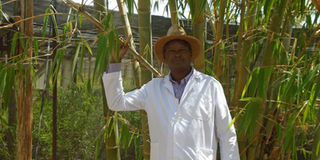Chance to harvest value from idle land

Jovenales Njuguna, a bamboo farmer and expert, poses next to a clump of bamboo in front of a bamboo seedlings greenhouse in his farm, Kitil Farm, in Isinya. The farm will provide bamboo seedlings and work with interested farmers in cultivating bamboo for biomass for Bidco Africa. PHOTO | BRIAN OKINDA | NATION MEDIA GROUP
What you need to know:
- Bamboo matures from three to five years, with an acre of land capable of hosting 244 seedlings.
- There are two varieties of bamboo, the Clumping (sympodial) and Running (monopodial). But Bidco farmers will go for the former because the latter tends to colonise an area.
- It is estimated that a hectare of bamboo plantation can yield 10-33 tonnes of dry stems per year depending on species, region and growing practices.
- Interested farmers, according to Bidco, can reach them through their website by filling expression of interest form or through email [email protected].
Jovenales Njuguna picks two transparent bottles containing tiny plants and examines them keenly before placing them on a table inside a laboratory on his Kitil Farm in Isinya, Kajiado County.
The tiny plants are bamboos and he is propagating them using the tissue culture method.
The former United Nations employee is the founder of the giant bamboo establishment located some 5km off Namanga Road, in Isinya.
On this day, Njuguna is working hard to propagate thousands of bamboo seedlings in readiness of increased demand.
His farm has been selected by Bidco Africa to propagate bamboo seedlings as the firm seeks to use the grass to power its factories, thus, creating a guaranteed market for 6,000 metric tonnes of bamboo culms each month.
Bidco presently uses over 200 tonnes of macadamia and coffee husks to generate power, however, the supply of both has become erratic and unsustainable, it says.
Therefore, working with Kitil Farm, Bidco will contract hundreds of farmers across the country to grow bamboo for its biomass needs.
“Bamboo is an elegant solution for our needs. It’s good for the environment because it rehabilitates the soil and is a clean energy source that reduces our carbon footprint. Bamboo is also a renewable resource. From a sustainability perspective, it’s a win-win,” says Vimal Shah, the CEO Bidco.
“And because it regenerates every time you harvest it, deforestation and forest degradation will not occur and the farmer will always be assured of a source of income,” he adds.
There are two varieties of bamboo, the Clumping (sympodial) and Running (monopodial). But Bidco farmers will go for the former because the latter tends to colonise an area.
The contracted farmers will sign a renewable 10-year contract with Bidco. Bamboo matures from three to five years, with an acre of land capable of accommodating 244 seedlings planted at a spacing of 5 by 5 metre, and with a longevity of up to 50 years.
VERSATILE AND LOW MAINTENANCE CROP
It is estimated that a hectare of bamboo plantation can yield 10-33 tonnes of dry stems per year depending on species, region and growing practices.
According to Bidco, farmers would earn an estimated Sh90,000 to Sh120,000 from an acre of bamboo.
The culms will be harvested upon maturity and allowed to dry to a moisture content of 15 per cent then chopped into pieces and delivered to Bidco by farmers.
“Bamboo grows across a wide variety of ecological zones, which gives farmers all over the country as investment opportunity,” John Kariuki, Bidco Africa’s lead agribusiness development officer explains.
Still, this calls for care in choosing which species to cultivate as those that thrive in dry conditions will not grow well in wet and humid conditions.
“Kitil Farm will recommend the bamboo species to be grown according to the farmers’ agro-ecological zones throughout the country while offering in-depth training on the crop’s cultivation to avert losses,” he says.
Bamboo is a low maintenance crop, according to Njuguna, with no known pests and diseases, therefore, its cultivation is virtually possible by any farmer.
“If you have idle land or wish to take up a new type of investment, bamboo is a good option,” says Kariuki, noting they are targeting individual farmers, chamas, saccos and companies both in Kenya and outside.
Interested farmers, according to Bidco, can reach them through their website by filling expression of interest form or through email [email protected].
Farmers must prove ability to supply at least a bamboo truck-load of 10 tonnes after each harvest.





